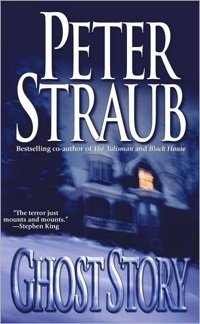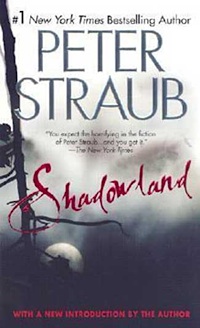Reading Those Across the River a few weeks ago got me to thinking about the big horror writers of the 1980s, the guys—and I remember them as mostly guys, though I welcome your input—who commanded serious space on the bestseller racks thirty years ago. The eighties were a good time for scarefests. Stephen King just about owned the number one spot atop the New York Times Bestseller list, and publishers were eager to deliver the macabre, the bizarre, and the out and out gory to the wide and willing readership he’d unearthed. It was also a time when several indisputably great horror writers were starting to hit their stride.
I thought I’d revisit a few of those novels of three decades past years past, starting with the year 1980 and the very first Peter Straub novel I ever read, Shadowland.
Set in 1958, Shadowland is the tale of a couple of privileged white boys, Tom Flanagan and Del Nightingale, who befriend each other during their freshman year at an upscale private high school in Arizona. Del has an uncle who’s a famous magician, and he introduces Tom to the practice of stage magic. It is a welcome distraction: Tom’s father is dying of cancer, and the two of them, along with the rest of the freshman class, are subjected to exceptionally harsh bullying by the seniors… especially a teacher’s kid known far and wide as Steve ‘Skeleton’ Ridpath.
But Tom starts to master the intricacies of card tricks and other illusions, the Carson School student body starts to fall prey to dreadful visions, all of them somehow tied to the two young magicians. Some of the boys see a mysterious man lurking around the school; others, a terrible owl. Skeleton steals a valuable glass bauble from a rival school, and the only witnesses to the theft are too terrified to report him, even though their teachers’ efforts to identify the thief add an Inquisition-like intensity to school events.
Over the year, Del starts to work real magic, levitating, giving Tom a glimpse into the world that lies beyond mere stage illusion—the world where defying the impossible is simply a matter of know-how and strength of will.
Things at the school heat up and then boil over into tragedy. To escape the bad memories, Del invites Tom to visit his uncle with him in Vermont for the summer. By now Tom suspects they aren’t fleeing the darkness so much as heading straight to its source, but he is afraid for Del. He goes to Shadowland, and agrees to meet magician Coleman Collins, out of a sincere desire to protect his best friend.
 In some ways, Straub’s 1979 novel Ghost Story is more of a straight up horror novel than this book, which followed it a year later. Shadowland has darkness and death aplenty, but somehow its tone is low-key… the horror in it creeps up on you, always present but rarely right in the reader’s face. Looking back at it again, what struck me first is how many of the novel’s elements would later become recurring motifs in Straub’s work: his books are jammed with utterly corrupt old men like Coleman Collins. Tom is a classic Straub protagonist, a talented young man who doesn’t understand his own specialness, who falls for a remote, fickle, and impossibly sexy girl with a Secret.
In some ways, Straub’s 1979 novel Ghost Story is more of a straight up horror novel than this book, which followed it a year later. Shadowland has darkness and death aplenty, but somehow its tone is low-key… the horror in it creeps up on you, always present but rarely right in the reader’s face. Looking back at it again, what struck me first is how many of the novel’s elements would later become recurring motifs in Straub’s work: his books are jammed with utterly corrupt old men like Coleman Collins. Tom is a classic Straub protagonist, a talented young man who doesn’t understand his own specialness, who falls for a remote, fickle, and impossibly sexy girl with a Secret.
In Shadowland too, he inserts a writer persona who might be taken for Straub himself, a first person narrator who gathers the story from Tom, years later, a classmate ho was also at the Carson school during their horrifying freshman year.
 Straub’s voice is one of my favorite things about him, and in this book I can now see it evolving: his writing isn’t quite as supple as it becomes later, by the time of Mystery (which came out in 1990). The images and flow are still remarkable, but his later works have the transparent lucidity of glass; it’s as though the reader is seeing the story through a perfectly clean lens, something that doesn’t obstruct but only makes the whole thing seem bigger and brighter.
Straub’s voice is one of my favorite things about him, and in this book I can now see it evolving: his writing isn’t quite as supple as it becomes later, by the time of Mystery (which came out in 1990). The images and flow are still remarkable, but his later works have the transparent lucidity of glass; it’s as though the reader is seeing the story through a perfectly clean lens, something that doesn’t obstruct but only makes the whole thing seem bigger and brighter.
Shadowland isn’t metafiction, either, but it skirts its furthest border, containing stories within stories: fairy tales that turn into guest appearances by the Brothers Grimm, creepy parables offered by the Carson School teachers to the traumatized student body, numerous references to the story of Jesus, and a long narrative Coleman Collins calls his “unburdening,” about how he discovered the magic within him—and made it monstrous—during his days as a doctor in the First World War. The novel’s frame story, where Tom reveals his past to his writer classmate, thus becomes a parallel unburdening, a necessary part, perhaps, of the true magician’s life cycle.
It’s a bit of a jigsaw puzzle, this book, and one reaches the end feeling as though, perhaps, not all of the original pieces were in the box. Shadowland‘s conclusion does not disappoint, but like the magicians who are its principal concern, it holds a little something back… daring you to look again, to see if you can figure out where the trick lies.
A.M. Dellamonica has a short story up here on Tor.com—an urban fantasy about a baby werewolf, “The Cage” which made the Locus Recommended Reading List for 2010.











Yep, I definitely enjoyed me some Peter Straub during the ’80s and ’90s, as well as Stephen King (obviously), Dean Koontz (back when he was good), the early Christopher Pike had some good horror elements, and James Herbert (a great British horror writer). There’s also Dan Simmons’ “Summer of Night.”
I read a lot of Stephen King, Dean Koontz and John Saul in the 80’s and 90’s…
Straub was the best one going back then. Still is today, actually.
Wasn`t Kathe Koja already doing horror back then?
These sort of books bring back a lot of memories. I was born in the 80’s and my mum was a horror buff. These books are like milk to me (quite literally as I hate drinking milk, but couldnt imagine going without books). The above mentioned authors.
A few that deserve a mention; Clive Barker ( ‘Weaveworld’), James Herbert’s ‘The Magic Cottage (and later ‘Once’), Raymond E Fiests’ ‘Faerie Tale’, John Soul’s ‘Suffer the Children’, John Halkns’ ‘Slither’ and edging into the 90’s Dean Koontz’ ‘Fear Nothing’.
There are so many I cant emember the titles/authers of. I may very well visit my mum and raid her bookshelves!
don’t forget robert mccammon!
Was it a stephen King novel that had a blonde girl abused in the care system and a time traveling nazi sociopath?
What about a story with a junkie mother and sweet phycic daughter, who marry into a wealthy, mysterious family? One which indulges in rich masquerades, that massage scene, torture, and dark rituals for the Goddess Sekhmet? And the one gran is the hero, the other the nemisis?
If anyone recognises them let me know…its bugging me.:D
Shadowland was also my first Straub; I found it somewhat difficult going. He would never use a paragraph to set mood and place where a page or two would do. He didn’t have that flow of prose the way King did…but I *very* much enjoyed The Talisman and Black House collaborations between the two.
Koontz never did it for me; his stuff always seems pretty light and predictable. Barker – now there’s the good stuff. Imajica wandered, but was delightful. Weaveworld took a bit to get going, but sold me on him.
Mystery has to be one of my favorite books of all time. It was the first book by Straub I read. I remember picking it up because I was intrigued by the cover: A blue rose and the words “I know what you did…” (something like that).
I will definitely hunt down Shadowland.
It is interesting to choose to focus on Peter Straub when looking back into the past of horror fiction, because the theme of most of his work has been that the past and the present are really one and the same. I on’t remember Shadowland that well, but I can never forget Ghost Story, the Chowder Society, and how yesterday and today blend into one great big magical/horrible now, where the ghosts of who we were and what we did haunt the living people we are today.
Hi, everyone–I got swept up in something unexpected and couldn’t answer your comments as they came in, even though I wanted to. But here I am now!
Alex, I’m definitely thinking there will be a Simmons among the books I look back to, though I am leaning to CARRION COMFORT.
Chuk, I will look into whether I read any Kathe Koja during the Eighties, and thank you!
Fox, I hope this leads to a great visit to your mom and her bookshelves.
Hey, Flosofl, MYSTERY’s my favorite too, but it didn’t quite fall into Horror. I have the exact edition you mention, and the blue rose says “I know what you are.”
Improbable Joe, I agree that GHOST STORY is unforgettable.